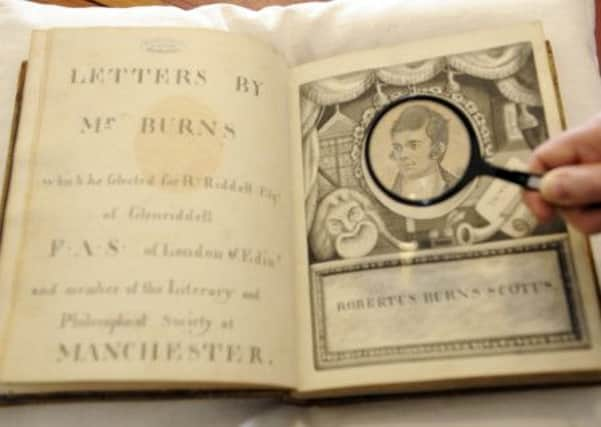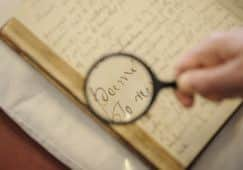Lost Rabbie Burns manuscripts set for exhibition


The display, which opens next week in time for Burns Night this Saturday, will celebrate the centenary of the two volumes, which include Tam o’ Shanter and Holy Willie’s Prayer, being repatriated to Scotland.
Believed to be worth at least £3 million, the volumes have been ranked as the most important piece of “Burnsiana” in existence, and are rarely available to be shown to the public.
Advertisement
Hide AdGerard Carruthers, co-director of the centre for Robert Burns studies, said: “They are certainly in the top two or three manuscript collections of Burns’ work. Arguably they are the most important and the most famous.”


The manuscripts were written for Captain Robert Riddell of Friar’s Carse, Dumfriesshire, a wealthy and influential friend of Burns. One volume contains verse, while the other contains 27 letters.
Carruthers said that due to their personal nature the manuscripts provide a unique insight into the type of man Burns was, and how he liked to portray himself.
“This is Burns putting on his best face for a man who he admires,” he said. “He’s not posting letters boasting about his sexual prowess – he does write letters about that but not in this volume.
“This is his finer feelings and sensibilities. He’s sculpting this collection for his friends, but in another way – with poems like Holy Willie’s Prayer which has scatological innuendo – it’s saying ‘here’s who I honestly am’. To some extent this is the ‘unofficial Robert Burns’.”
However Riddell and Burns quarrelled shortly before Riddell’s death in 1794, and Burns tried to get the collection back from Riddell’s sister.
Advertisement
Hide Ad“I know that at the wish of my late friend, I made a collection of all my trifles in verse which I had ever written,” Burns wrote to Riddell’s sister.
“They are many of them local, some puerile and silly, and all of them unfit for the public eye. As I have some little fame at stake — a fame that I trust may live when the hate of those who ‘watch me for my halting’, and the contumelious sneer of those whom accident among my superiors, will, with themselves, be gone to the regions of oblivion; I am uneasy now for the fate of those manuscripts.”
Advertisement
Hide AdThe volumes eventually ended up in the hands of Burns’ biographer Dr Currie, who passed them on to his son, whose wife gave them to the Liverpool Athenaeum in 1853, before disappearing from sight for some time.
They eventually re-emerged in the hands of John Gribbel, an American collector based in Philadelphia, who gifted them to the National Library of Scotland in 1914 under terms which ensure that they will remain in possession of “the people of Scotland forever”.
“They passed through the hands of several American collectors and actually disappeared out of sight for a while,” said Carruthers.
“Gribbel realised they were very important and although he had no particular Scots connection he understood that they needed to be repatriated. They were presented to Scotland and a proper home was found and that’s where they have been to this day.”
Although the deal to repatriate the manuscripts was made in 1914, they did not make it to Edinburgh until 1920, because of the outbreak of the First World War.
Robert Betteridge, the NLS curator who organised the display, said: “We are only able today to make the Glenriddell Manuscripts available for people to see because of the intervention and generosity of John Gribbel.
Advertisement
Hide Ad“It is fitting that we mark the centenary of their gift to the people of Scotland in this way.”
Carruthers said the manuscripts still had relevance for readers today.
Advertisement
Hide Ad“They show the big-ness of Burns,” he said. “Here is a man who can write polished English, fine Scots, and songs and long poems in his best handwriting in his highest sensibility, with all his energy and comical genius.
“You get a sense of ‘here is a real artist’, and he knows that when he puts them together. You hear people saying that Burns wasn’t confident, but he was damned good and here he knows he is damned good.”
Carruthers will give an account of the story of the repatriation of the Glenriddell manuscripts at the NLS next Thursday.
Twitter: @emmacowing